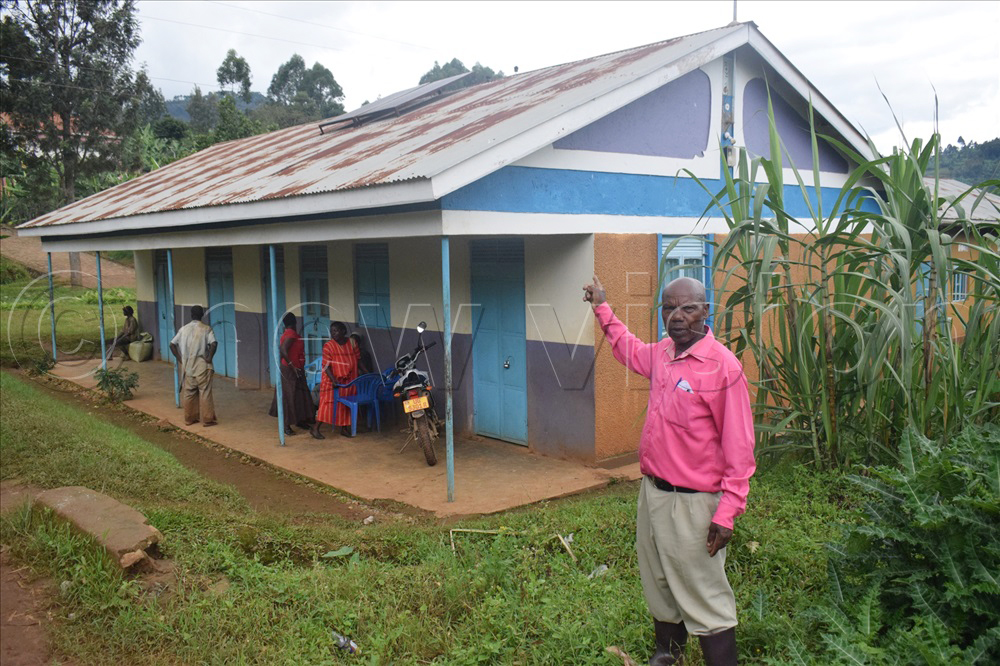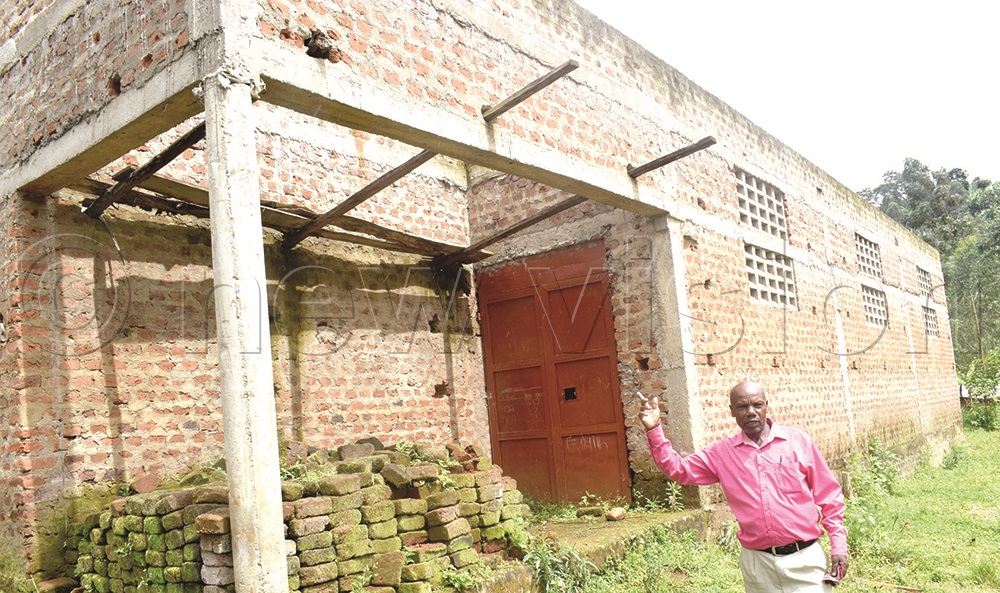By Moses Nampala
At the height of the struggles faced by small-holder Arabica coffee farmers in Bududa district 12 years ago, a courageous farmer emerged to lead others in turning things around.
Godfrey Bwaya, 62, from Bungara, Kikholo sub-county in Bududa district, mobilised farmers and urged them to stop selling raw produce.
He implored them to form small farmer groups of not less than 10 members.
“The trick yielded instant results as it strengthened the farmers’ bargaining power,” he said.
This model has since rescued them from exploitation by brokers and middlemen.
“The farm gate price of the produce has shown a progressive upward trend,” observes Bwaya, who is also the founder chairperson of Elgon Farmer’s Cooperative Union Limited in Bududa district.
Over the years, the small-holder farmer groups have evolved into primary farmer cooperative societies that now comprise the cooperative union.
Today, the cooperative union boasts a membership of 1,650 small-holder farmers drawn from 12 sub-counties of Bududa district.

The volume of coffee production has increased from 900,000kg per season to between 2.9 and 3.1 million kilogrammes of patched Arabica coffee per season. The cooperative is now financially stable, with farmer membership remittances averaging sh600m, from which members can access credit at a modest interest rate.
Arabica coffee
Traditionally, Arabica coffee has exclusively thrived in the belt surrounding Mount Elgon in eastern Uganda.
This sub-region encompasses the districts of Mbale, Manafwa, Bulambuli, Namisindwa, Bududa and Sironko, along with Kapchorwa, Kween and Bukwo. For ages, this belt has claimed its space as the hub of the cash crop, owing to its high altitude and unique volcanic fertile soils.
Coffee harvest season
During the harvest season, which typically spans from August to February each year, Margaret Wandukwa, 47, a farmer, who is also a member of the cooperative union, reminisces about the past when brokers and middlemen would set up camp in the area until the season’s end.
“They would traverse this remote countryside on foot, visiting every household to buy raw cherries produce cheaply,” she recalls.
Each broker and middleman would typically be accompanied by a group of energetic youth laborers to carry the bulk of the produce after successful transactions with individual farmers. These intermediaries carried bundles of cash to entice farmers into selling their produce at low prices.

“They would wave money while asking us to sell them cherries (freshly harvested coffee),” recalls Robinah Nabusale, another cooperative farmer member.
“They used to buy a kilogramme of cherries between sh500 and sh700 and later sell it at sh5,000 to big coffee dealers,” Wandukwa adds.
Agatha Buteme, 47, another small-holder farmer and member of the cooperative union, remembers how brokers and middlemen would justify their actions by claiming they were doing farmers a favor and saving them from the burden of transporting the produce.
How bwaya ended exploitation
Wandukwa recounts how farmers heeded Bwaya’s calls to stand against exploitation during numerous village forums.
“During the subsequent harvest season, I joined the farmers’ group and refused to sell raw coffee produce to brokers and middlemen,” she recalls.
Previously, Wandukwa would earn sh400,000 from the sale of raw coffee cherries in a season.
“However, after joining the farmers’ group, I processed my produce and dried it. The processed produce fetched me sh4m. I have never looked back since then,” she says.
Stephen Namanga, 54, a farmer, who is also the chairperson of Bulucheke Primary Cooperative Society, highlights the effectiveness of forming small groups.
“The harvest season is a considerably arduous chore, owing to the litany of activities, ranging from picking, pulping, washing, and drying the produce. Working in small farmer groups lessens the fatigue an individual farmer would endure,” he observes.
Bwaya is pleased that his campaign to end the era of farmer exploitation has yielded tangible results. What began as small farmer groups has evolved into 10 primary farmer cooperative societies that now constitute the cooperative union.
“During the formative stage of the cooperative movement, farmer community members took time to identify critical barriers that hindered individual farmers from realizing higher earnings from their produce. Among these challenges was the inadequate availability of machines for processing the produce at harvest.”
Rigid processing exercise
When ripe Arabica coffee cherries are harvested from the coffee tree, they must be pulped within 24 hours, or the bulk of the harvest will spoil. Pulping involves extracting fresh coffee beans from the ripe, freshly harvested coffee cherry.
This essential process is carried out using a specially designed device called a pulping machine, available in both manual and motorised forms.
“During the formative stages, farmers were encouraged to make contributions that have since evolved into a cooperative financial pool, currently standing at sh600m. These resources are allocated to address critical challenges, such as purchasing pulping machines and coffee hullers,” explains Bwaya.
In the early stages, farmers faced challenges with drying spaces for the produce and storage facilities. They identified modest flat spaces in the predominantly steeply hilly areas for this purpose.
“Using resources from the farmers’ financial pool, we leased the flat spaces, which now serve as coffee collection centres. We have also constructed semi-permanent structures to serve as storage facilities,” Bwaya adds.
The cooperative union was officially registered in 2014 after small farmer groups were consolidated into 10 primary cooperative societies.
Achievements
Brokers and middlemen have since exited the business, as few farmers now sell their raw coffee through them. In addition to the cooperative’s purchase of critical processing machines, which are now used communally, they have also identified reputable agricultural firms to supply farmers with genuine inputs.
Utilising resources from farmer remittances, they have sourced agricultural experts to continuously educate farmers on the best agronomic practices for the cash crop. Individual farmer members, such as Wandukwa, have been able to construct permanent houses.
“The proceeds from coffee have helped me pay school fees for my five children,” observes the widow.
Delight among cooperative members varies, with some constructing permanent houses, buying land and others acquiring dairy breeds from neighbouring Kenya.
Bwaya mentions a significant achievement from two years ago: “We have attracted direct foreign buyers of our coffee,” he observes, though he remains hesitant to disclose more about the firm.
Challenges of coffee growing
Bwaya observes that Bududa district, situated in a high-altitude region and in proximity to Mount Elgon National Park, has been among the primary factors favouring this part of the countryside, experiencing heavy rainfall throughout the year.
However, heavy rains during the harvest season have made both human and motorist movement difficult in the mountainous terrain.
“We have managed strenuously, but one of our plans is to acquire donkeys to assist the farmers in transporting the coffee from the fields to processing stations,” Bwayo explains.
He further notes that the mobilisation of farmers into cooperative movements and the benefits that come with it have led to an increase in production.
However, a challenge that remains is acquiring more screen-house facilities, given the enormity of freshly processed coffee realised in a season that requires drying.
Who is Bwaya?
Born 62 years ago to Joseph Stephen Namakali and Anasilita Khanyerere of Bubujere in Nakatsi sub-county, Bududa district, Bwaya’s educational journey began at Buchuya Primary School in Nakatsi sub-county.
He later continued his studies at Bukedi College Kachonga and eventually obtained a diploma in public administration from Makerere University. Growing up and living in the remote countryside, Bwaya developed a passion for farming.
“From a young age, I endeavoured to take a keen interest in coffee production,” he reflects.
Despite his limited educational background, Bwaya recognised the intrinsic value that Arabica coffee held, contrasting sharply with the destitution experienced by ordinary farmer communities.
This stark reality, coupled with the exploitation by brokers and middlemen who had profited for decades at the expense of small-holder farmers, spurred Bwaya to action.
“This is how I initiated a cooperative movement with the aim of liberating small-holder farmers from exploitation,” he explains.





